PROTECT to Begin Enrollment in RECOVER Pediatric Study
On June 10, 2022, Northeastern University and PROTECT SRP Center received approval to begin enrollment in the Researching COVID to Enhance Recovery (RECOVER) Initiative study “A Multi-Center Observational Study: The RECOVER Post-Acute Sequelae of SARS-CoV-2 (PASC) Pediatric Cohort Study.” Northeastern’s participation in the RECOVER initiative is led by Emily Zimmerman (PI) in collaboration with Akram Alshawabkeh, José Cordero, and Carmen Vélez Vega. On site Project Coordination and Management is led by Zaira Rosario-Pabon, the PROTECT Director of Research in Puerto Rico.

The National Institutes of Health (NIH) launched the RECOVER Initiative to learn why some people have prolonged symptoms or develop new or returning symptoms after the acute phase of the infection from SARS-CoV-2, the virus that causes COVID-19. The long-lasting health effects related to COVID-19 are often referred to as Long COVID or PASC. The most common symptoms include pain, headaches, fatigue, “brain fog”, shortness of breath, anxiety, depression, fever, chronic cough, and sleep problems. The longevity and severity of symptoms varies from person to person.
New York University (NYU) Langone Health is the primary NIH grant recipient and coordinator for the RECOVER adult cohort. The Arkansas Children’s Research Institute (ACRI), in collaboration with University of Arkansas Medical Sciences (UAMS) College of Medicine, is one of 10 sub-recipient hubs for the pediatric cohort study. Northeastern University (PROTECT) is one of 15 pediatric enrollment sites under the ACRI umbrella.
Because Puerto Ricans face unique health, environmental, and social challenges, PROTECT’s participation in the RECOVER pediatric study is necessary to fully understand PASC in children nationally. PROTECT’s continuously growing cohort enables the inclusion of Puerto Ricans in national health studies like RECOVER, and ultimately ensures more representative research populations and findings.
The RECOVER Pediatric Study is a combined retrospective and prospective, longitudinal, observational meta-cohort of individuals from newborns to 25-year-olds. Individuals enter the cohort with and without SARS-CoV-2 infections at varying stages before and after infection. These individuals, with and without infection, and with or without COVID-19 symptoms, will be followed for four years to identify the risk factors and occurrence of Long COVID, or PASC. Nationally, up to 20,000 dyads, or children and young adults with and without history of SARS-CoV-2 infection and their primary caregiver, are anticipated to enroll.